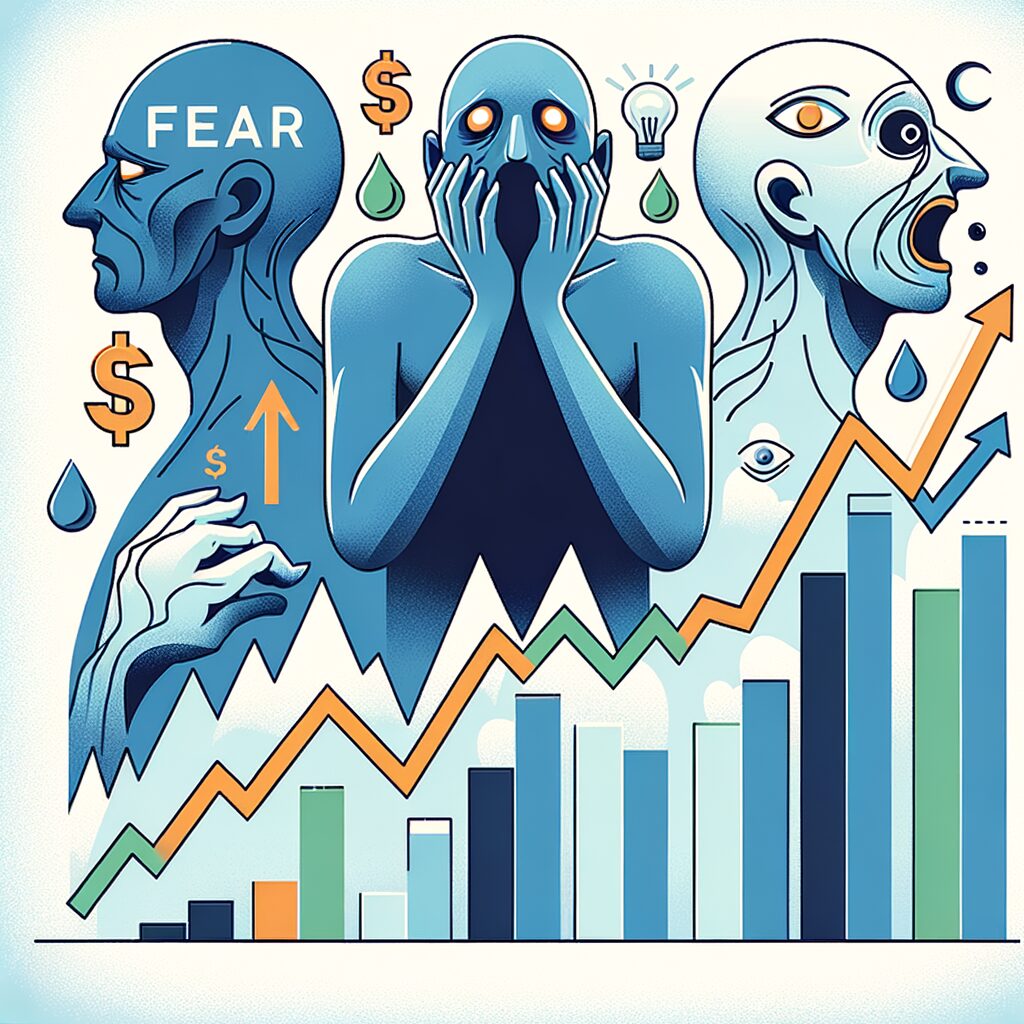
“Master Your Mind, Conquer the Market: Trading Psychology for Fearless and Disciplined Success”
Mastering Emotional Discipline: Key Strategies for Conquering Fear and Greed in Trading
Trading Psychology: Overcoming Fear and Greed for Consistent Trading Success
In the world of trading, success is not solely determined by one's knowledge of the markets or the sophistication of their strategies. The psychological aspect of trading plays a pivotal role in shaping the outcomes of one's investment decisions. Fear and greed, two primal emotions, often stand as formidable adversaries on the path to consistent trading success. Mastering emotional discipline is, therefore, a critical component for traders aiming to conquer these emotional responses and achieve long-term profitability.
Fear, in the context of trading, manifests as the trepidation of loss or the anxiety of missing out on potential gains. It can lead to hesitation, causing traders to miss lucrative opportunities or to exit positions prematurely. Conversely, greed drives traders to chase performance or take on excessive risk in the pursuit of higher returns, often leading to disastrous consequences. The interplay between fear and greed can create a psychological tug-of-war, pulling traders away from rational decision-making and towards impulsive actions.
To navigate the treacherous waters of emotional trading, one must first acknowledge the presence of these emotions. Self-awareness is the foundation upon which traders can begin to build emotional discipline. By recognizing the emotional triggers and understanding how they influence behavior, traders can start to develop strategies to mitigate their impact.
One effective strategy is to establish a well-defined trading plan. A comprehensive plan includes entry and exit criteria, risk management rules, and a clear outline of one's investment goals. Adherence to this plan can serve as a bulwark against the whims of fear and greed, providing a structured approach that prioritizes logic over emotion. When traders commit to following their plan, they can reduce the likelihood of making decisions based on fleeting emotional states.
Another key strategy is to practice mindfulness and stress-reduction techniques. Mindfulness can enhance a trader's ability to remain focused and calm, even in the face of market volatility. Techniques such as meditation, deep breathing exercises, or even engaging in regular physical activity can help traders maintain a level head, thereby improving their capacity to stick to their trading plan.
Risk management is also an essential tool in the trader's arsenal against fear and greed. By determining acceptable levels of risk beforehand and sticking to them, traders can protect themselves from the temptation to overextend their positions in the pursuit of greater profits. Setting stop-loss orders and taking profits at predetermined levels can help automate these decisions, removing the emotional burden from the trader during moments of market stress.
Moreover, continuous education and reflection are vital for emotional growth. Traders should regularly review their trades, both successful and unsuccessful, to learn from their experiences. This process of reflection can help identify patterns in emotional responses and decision-making, allowing traders to refine their approach and become more disciplined over time.
In conclusion, the journey to mastering emotional discipline in trading is ongoing and requires dedication. By acknowledging the influence of fear and greed, creating a robust trading plan, practicing mindfulness, implementing sound risk management, and engaging in continuous self-reflection, traders can fortify their psychological resilience. Overcoming these emotional obstacles is not an easy feat, but for those who commit to the pursuit of emotional discipline, the rewards of consistent trading success are well within reach.
The Trader Mindset: Essential Psychology Tips for Overcoming Market Emotions

Trading Psychology: Overcoming Fear and Greed for Consistent Trading Success
In the world of trading, success is not solely determined by one's knowledge of the markets or the sophistication of their strategies. The psychological aspect of trading plays a pivotal role in shaping the outcomes of one's investment decisions. Fear and greed, two of the most dominant emotions in trading, can cloud judgment, leading to impulsive decisions and potentially detrimental consequences. Understanding and managing these emotions is crucial for achieving consistent trading success.
Fear, a natural response to a perceived threat, can manifest in various forms within the trading environment. The fear of loss can cause traders to exit positions prematurely or to avoid taking necessary risks. Conversely, the fear of missing out (FOMO) can lead to chasing performance, entering trades at inopportune times, and overtrading. To overcome these fears, traders must cultivate a mindset grounded in discipline and rationality. Establishing a well-thought-out trading plan with clear entry and exit criteria can provide a framework that helps traders stick to their strategies, even when emotions run high.
Greed, on the other hand, is the excessive desire for wealth, often leading to taking on too much risk or holding onto winning positions for too long in the hope of even greater profits. This can result in significant losses when the market turns. To combat greed, traders must set realistic profit targets and adhere to them. It is also beneficial to implement strict risk management rules, such as setting stop-loss orders, to protect gains and limit losses.
Moreover, the cultivation of patience is an invaluable asset in the trader's psychological toolkit. Patience allows traders to wait for the right opportunities, rather than acting on every market fluctuation. It also helps in maintaining a long-term perspective, which is essential for weathering the inevitable ups and downs of the market.
Another critical aspect of trading psychology is self-awareness. Traders must be attuned to their emotional state and recognize when their decisions are being influenced by fear or greed. Keeping a trading journal can be an effective way to track one's emotional triggers and patterns. By reviewing past trades and the emotions associated with them, traders can learn from their experiences and make more informed decisions in the future.
Additionally, it is important to maintain a balanced lifestyle. Stress and fatigue can exacerbate emotional responses, so ensuring adequate rest, exercise, and time away from the markets can help maintain a clear and focused mind.
Finally, continuous education and psychological conditioning can fortify a trader's mindset against the negative impacts of fear and greed. Engaging with a community of traders, seeking mentorship, and studying psychological trading literature can provide insights and strategies for managing emotions effectively.
In conclusion, the path to consistent trading success is not just about mastering the markets; it is equally about mastering oneself. By acknowledging the powerful influence of fear and greed and implementing strategies to mitigate their effects, traders can develop the mental fortitude necessary to navigate the markets with confidence. The trader's mindset, therefore, is not static but a dynamic and evolving aspect of their skill set, requiring ongoing attention and refinement. With the right psychological approach, traders can enhance their decision-making process, leading to more consistent and profitable outcomes.
Trading Psychology 101: Building Resilience Against Fear and Greed for Market Success
Trading Psychology: Overcoming Fear and Greed for Consistent Trading Success
In the realm of financial markets, the psychological fortitude of a trader is as crucial as their technical acumen or strategic prowess. The twin specters of fear and greed loom large over the trading landscape, often dictating the difference between success and failure. Understanding and mastering the emotional aspects of trading is essential for those seeking consistent market success.
Fear, a primal emotion, manifests in the trading environment as the trepidation of loss or the anxiety of missing out. It can paralyze traders, causing them to exit profitable positions prematurely or prevent them from taking necessary risks. Conversely, greed, characterized by an insatiable desire for more profits, can lead to overtrading or holding onto winning positions for too long, hoping for an even greater payoff. Both emotions, if left unchecked, can cloud judgment, leading to impulsive decisions and deviation from a well-thought-out trading plan.
The first step in building resilience against these emotional forces is awareness. Traders must recognize the psychological triggers that prompt fear and greed. This self-awareness enables individuals to anticipate their emotional responses and prepare strategies to counteract them. For instance, a trader who knows they are prone to fear-driven decisions might work on reinforcing their confidence in their trading system or may use stop-loss orders to manage risk without succumbing to panic.
Moreover, cultivating discipline is paramount. A disciplined trader adheres to their trading plan, which should include predefined entry and exit points, position sizing, and risk management rules. By committing to this plan, traders can mitigate the influence of emotions on their decision-making process. It is the discipline that ensures a trader does not deviate from their strategy during times of high market volatility or personal uncertainty.
Another effective technique for combating fear and greed is to maintain a trading journal. Documenting trades, along with the emotional state during those trades, can provide valuable insights into behavioral patterns. Over time, this record-keeping practice can help traders identify situations where emotions may have led to suboptimal decisions, allowing them to adjust their approach accordingly.
Furthermore, setting realistic expectations is crucial. The markets are inherently unpredictable, and no trader can expect to win every trade. By accepting losses as a natural part of trading and focusing on long-term performance rather than short-term gains, traders can maintain a level head and avoid the emotional extremes of fear and greed.
Lastly, continuous education and psychological conditioning can fortify a trader's mindset. Engaging with trading communities, seeking mentorship, and studying market psychology can provide traders with the tools and support needed to navigate the emotional rollercoaster of trading. Additionally, practices such as meditation or mindfulness can enhance a trader's ability to remain calm and focused under pressure.
In conclusion, the journey to consistent trading success is as much about mastering one's own psychology as it is about understanding the markets. By acknowledging the powerful influence of fear and greed, implementing disciplined trading practices, keeping meticulous records, setting realistic goals, and investing in ongoing education and self-improvement, traders can build the psychological resilience necessary to thrive in the face of market adversity. It is through this holistic approach to trading psychology that investors can aspire to not only survive but excel in the dynamic world of trading.
Harnessing Trading Psychology: Techniques to Balance Fear and Greed for Improved Decision-Making
Trading Psychology: Overcoming Fear and Greed for Consistent Trading Success
In the world of trading, success is not solely determined by one's knowledge of the markets or the sophistication of their strategies. An often-overlooked aspect that is just as crucial is trading psychology. The emotional roller coaster experienced by traders can lead to erratic decision-making, influenced heavily by two primary emotions: fear and greed. These emotions, if not managed properly, can be detrimental to a trader's portfolio. However, with the right techniques, traders can balance these emotions and improve their decision-making process, leading to consistent trading success.
Fear, in the context of trading, manifests as the trepidation of entering a trade or the panic that ensues when a trade is not going as planned. This emotion can cause traders to miss profitable opportunities or to exit positions prematurely, thus limiting their potential gains. On the other hand, greed drives traders to chase performance, take on excessive risk, or remain in a profitable trade for too long, often resulting in significant losses when the market turns. The key to overcoming these emotions lies in developing a disciplined trading plan and sticking to it.
Firstly, traders must establish clear goals and risk tolerance levels. By doing so, they create a framework that guides their actions and helps them stay focused on long-term objectives rather than short-term fluctuations. This approach reduces the likelihood of making impulsive decisions driven by fear or greed. Additionally, setting stop-loss orders can help traders manage risk and protect their capital, providing a safety net that mitigates the fear of losing money.
Moreover, it is essential for traders to maintain a level of detachment from their trades. Emotional attachment can cloud judgment and lead to decisions that are not in line with one's trading plan. To achieve this detachment, traders should treat trading as a business, where each trade is merely a transaction devoid of emotional weight. This mindset enables traders to evaluate the markets objectively and make decisions based on logic and analysis rather than emotion.
Another effective technique is to keep a trading journal. Documenting trades, including the rationale behind each decision and the emotions felt at the time, allows traders to reflect on their behavior and identify patterns that may be influenced by fear or greed. Over time, this self-awareness fosters emotional control and helps traders to recognize and correct any irrational tendencies.
Furthermore, continuous education is vital. By staying informed about market conditions and learning from past experiences, traders can build confidence in their decision-making abilities. Confidence, in turn, reduces the impact of fear, as traders feel more secure in their analysis and choices. It also tempers greed, as knowledgeable traders are more aware of the risks involved and the importance of sticking to their strategies.
Lastly, it is crucial for traders to take breaks and avoid burnout. The intense focus required for trading can be mentally exhausting, making traders more susceptible to emotional decision-making. Regular breaks help to clear the mind and maintain the emotional equilibrium necessary for consistent trading success.
In conclusion, while fear and greed are natural emotions that all traders experience, the ability to manage these emotions is what separates successful traders from the rest. By implementing a disciplined trading plan, maintaining emotional detachment, keeping a trading journal, pursuing continuous education, and taking regular breaks, traders can harness their trading psychology. These techniques enable them to make balanced, informed decisions, paving the way for consistent trading success in the ever-changing financial markets.


